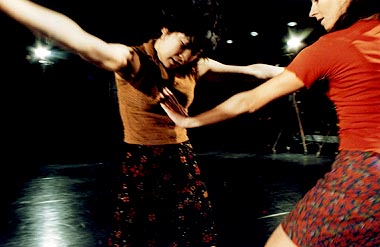 Review of Nina Vangeli
Review of Nina Vangeli
 Photos from the performance
Photos from the performance
Déja Donne: In Bella Copia
One day we will discover that we are not ourselves, but instead someone else who we really ought to be. One day we will dare to bare ourselves and with irony look at the figure that we used to call "me" - to laugh at its power, its confidence and truth, its crude naiveté.
One day we will look back and will still feel so much pain that we will stop pretending. We will revolt against our nakedness and "CLEANLIGRAPHY".
Czech premiere of the new performance "In Bella Copie" by the world-wide acclaimed dance group Déja Donné. The world premiere of this performance was presented on October 19th, 2001 in the Luzernertheater in Switzerland. Following its Czech premiere in Archa Theatre, it will travel to Berlin, Nuremberg, Milan, Bruges, Turin, Bristol, Nottingham and London.
The dance group Déja Donné was founded by Lenka Flory and Simone Sandroni in 1996 in Prague, when they created together the performance of the same name. The premiere performance of "Déja Donné" was presented in Ghent in Belgium in 1997. Additional projects include the now legendary performance "Aria Spinta", whose premiere performance took place in the attic of La Filature Mulhouse in France in June 1999. During its almost three years of existence, Aria Spinta has been performed in 15 European countries and the USA. Its celebratory 100th performance was feted in March 2002 as part of the Blickfelder Festival in Zurich. The Prague public has had the possibility to see the performance in several repeat performances in Archa Theatre, the most recent being in the autumn of 2000.
The Italian choreographer, dancer and director Simone Sandroni contributed to the development of the famous Belgium group Ultima Vez in 1986. In 1993 she established her own dance group Ernest in Brussels. Since 1996, together with Lenka Flory, she leads the group DEJA DONNE. In the Czech Republic, we mainly had the chance to get to know Simone Sandroni as a guest choreographer at the Duncan Centre dance conservatory (with the performances GET THERE, STRAPPI STUZZICANTI, WILLIAM'S DREAM) and at the Academy of Musical Art in Bratislava (with the performance SUSPICIOUS LOVE). For Petr Tyc, she created the solo performance DISCREET OBSESSION.
The choreographer Lenka Flory worked in the group Studio Komorního Tance (Chamber Dance Studio) CR, Czurda Tanztheater (Germany) and Ultima Vez (Belgium). After her return to the Czech Republic, she taught at the Duncan Center and for her students and colleagues created the choreography for a piece called "7 Hours and 35 Minutes". Among her most successful choreography works created in the CR, is the performance "...and "Where is Marie?" (1995). In 1994 she established an international program at the Duncan Center, which regularly introduced the works of progressive European choreographers. Two years later this program became the familiar International Theatre Dance Festival. She was its director until 2000. From 1996 she has led, together with Simone Sandroni, DÉJA DONNÉ.
Following its premiere and repeat performances in the Lucerne Opera, the performance IN BELLA COPIA was presented in Stadschouwburg Haarlem, Pole Sud Theatre Strasbourg, Teatro Comunale di Ferrara, Teatro Kismet Opera Bari, and in Politeama Greco, Lecce.

Review of Nina Vangeli
This dance piece is a battle, complete with vice, egoism, and private aggression. A sarcastic spectacle working in contrasts: the stage changes into the backstage, light into shadow, intimacy into exhibition, power into powerlessness. The dancers are also masters of the use of space and lights - choosing themselves what will remain hidden and what will be highlit. Charged with this important personal task (and personal power), the performers play out their theatrum vitae with the courage of missionaries in a lost land, dancing the dance of the action hero at preposterous speeds, and touching us with a scene about a virginity lost forever. It's like a medieval farce - fights, sex, and no mercy. No positive characters. In these masterfully constructed situations, the bizarre narcissistic figures we watch are fuelled by lust and the desire for attention. In unspoken bitter hope the moral paradox of our bodies is revealed - our bodies are the proverbial vessels of sin, and yet in their naked and vulnerable they are the image of innocence, the desirable "fair copy" of all of us.
Nina Vangeli

